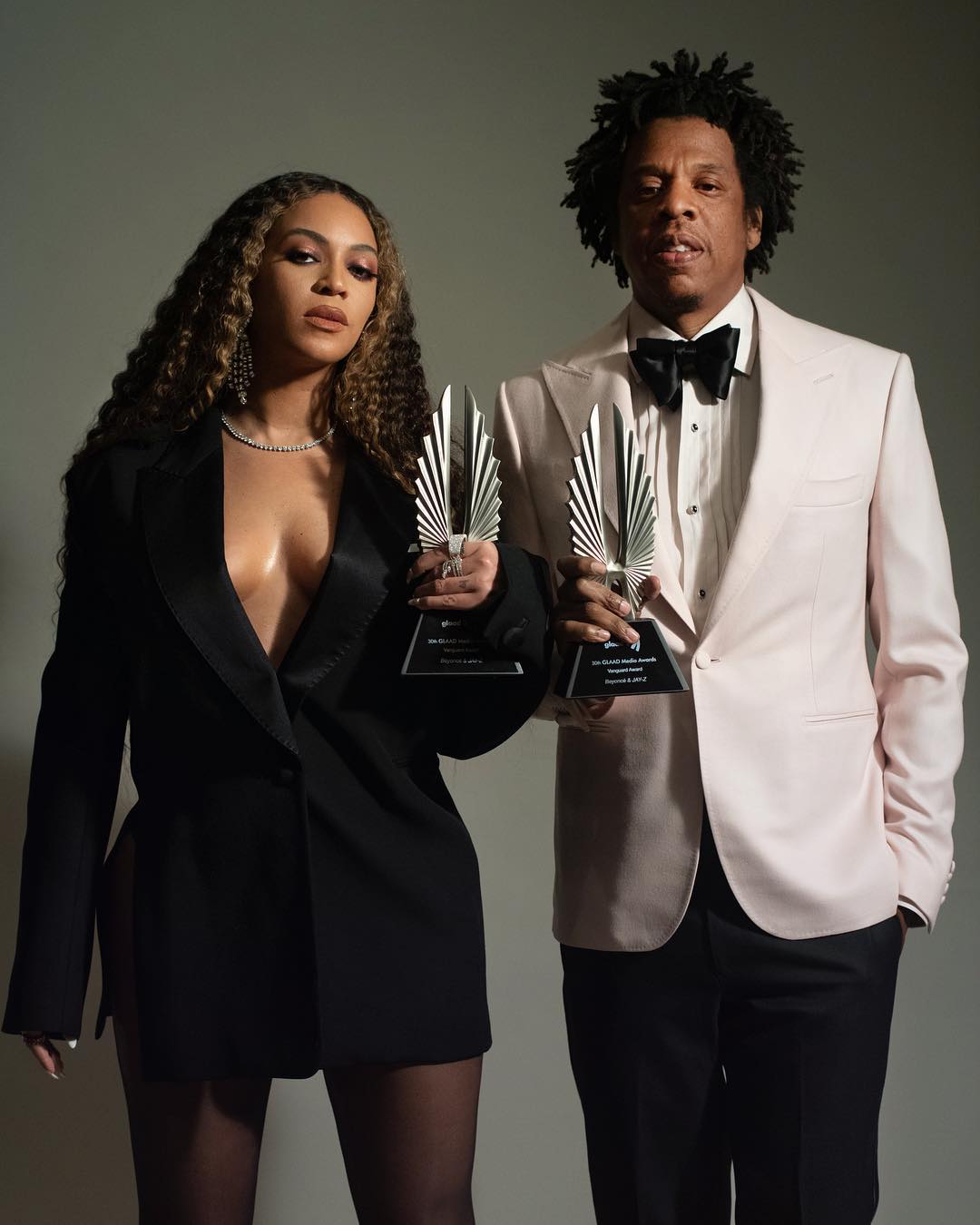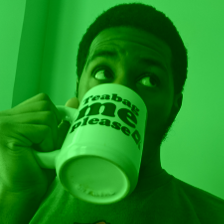At the 2019 GLAAD Media Awards, held last Thursday, Beyoncé and Jay-Z were presented with this year’s Vanguard Award. This is an award is meant to annually acknowledge people who don’t identify as LGBTQ, but are considered to have made great strides towards promoting the acceptance of LGBTQ people (in other words, it’s an award for LGBTQ “allies”). When I first learned that GLAAD was planning on presenting them with this award a couple of weeks back, I…immediately had questions.
In doing a little digging to figure out what all, exactly, Bey & Jay have done to help advance the plight of LGBTQ people, the answers that I found largely just reaffirmed what I’d long figured. That their advocacy is cool, but nothing particularly risky, threatening to the status quo or revolutionary. Look, y’all know I love me some Beyoncé (and Jay-Z is cool too, or whatever). But let’s be honest. This award is just…not it.
Jay-Z, in particular, has been praised for his song “Smile,” which pays homage to his mother. There’s also him including Janet Mock, Black Trans woman and activist, in his video for “Family Feud.” Those things are great and they absolutely matter. But if we’re talking about significant, game-changing moves, or “incredible strides towards changing stigmas in the hip-hop community” (as Beyoncé said of her husband in their acceptance speech), this is not that. Let’s also not overlook that, ultimately, Jay made money off of that project while risking virtually nothing. I’m more interested in knowing how Jay-Z has worked to change the dynamics of hip-hop culture in more structural, substantive ways. Particularly, knowing how hip-hop culture has deliberately marginalized LGBTQ folks, virtually throughout its entire existence. Has he intentionally sought out Black, openly LGBTQ rappers to sign, develop and/or promote? Has he used his position to challenge his industry peers for spewing anti-LGBTQ bigotry? How many openly LGBTQ folks has he collaborated with (in contrast to all the anti-LGBTQ folks he’s worked with)?
[the_ad_placement id=”inarticle”]
We know Beyoncé is at least cool with LGBTQ folks. But like Jay-Z, she’s mainly ever put herself in proximity to us in a ways that ultimately benefit her, while risking very little (if anything, at all). It’s been well-noted how Beyoncé is perfectly fine staffing Black Queer creatives for most any of her behind-the-scenes tasks, such as hair & makeup, design and choreography. But when it comes to actually spotlighting Black LGBTQ folks, openly and intentionally, particularly in front of more large audiences, this is where she’s long fallen short.

I do wanna emphasize that this isn’t remotely about trying to condemn Beyoncé and Jay-Z. I’m not knocking the things that they have done, and I don’t believe their intentions are bad. I’m sure that, in their minds, they really do believe that their forms of “allyship” are changing the game in some way. But really, their methods of support for the LGBTQ community are largely passive, at best. And while it serves as a nice signal for LGBTQ people, is it necessarily serving to challenge social norms and move anything forward? Does their “allyship” even particularly stand out from other areas of the entertainment industry? To the point of warranting an official award from one of the most visible LGBTQ organizations in the country? I just don’t think so.
Really, the crux of this issue isn’t even necessarily them, or any other cisgender-heterosexual “allies.” I absolutely do think it’s on cis-hetero folks to challenge themselves in their “allyship” more and always question how they can most effectively show up for us. But I also think we, as LGBTQ folks (and people of marginalized groups, in general), need to really examine the standards that we hold LGBTQ “allies” to. Part of why folks like Beyoncé, Jay-Z and others walk around believing they’re doing their part is because we go out of our way coddle them and settle for the bare minimum.
I’ve theorized on this in a piece that I wrote a few years back, critically examining the ways that LGBTQ “allies” move through our spaces, and much of that commentary still applies today.
Queer people who support the presence of these cishet “all-lies” will take these things at face value and argue that they’re showing support by simply being there, voicing affirmation and “embracing” our corner of the population. They’ll probably even argue that we should be grateful for the “support.” But is that really what’s happening here? Are we really being supported? Are our issues and struggles really being centered and properly addressed, or are our lives and spaces being taken advantage of for the gain of people who already have more access and privilege? … Are they asking what can they give to us, or what can we give to them? Are these people supporters of our culture, or consumers of it? Maybe the answers are all the former, maybe all the latter, or maybe a combination of both. Either way, the end result remains the same.
As I’ve also touched on in past work, around navigating our connections to non-LGBTQ people, I believe that, after generations of severe abuse and marginalization, we’ve become so conditioned to desperately cling to most any kind of affirmation and “inclusion,” and overemphasize it as something inherently revolutionary. Marginalized people, simultaneously clamoring for any acceptance, while fearing losing whatever flimsy support we do manage to garner, directly shapes how we often feel the need to celebrate whatever crumbs we get from those in more centered and dominant positions. I also think that the constant attempts to pander at cis-heterosexual folks blatantly comes across as desperation to be with the “in crowd” (which, honestly, is why GLAAD’s lil Vanguard Award exists, in the first place…but that’s another topic). And it’s a desperation that I honestly just find kind of sad.
I’m actually not in the business of telling folks what to do; while I personally tend to find “allyship” inadequate and have no problem naming it as such, “allies” can ultimately do whatever they want. But when we’re talking about folks in the LGBTQ community reaching out to actually reward folks (a questionable practice, in and of itself), while the bar for what we consider exemplary “allyship” is sitting below sea level? This is something that really needs to be interrogated. These paltry, symbolic efforts are not moving the needle forward like many of us would like to think they are. And given the rising levels of violence that Black LGBTQ folks are subject to in our communities, we’re incredibly overdue to start holding folks to a higher standard before we even talk about going out of our way to praise them for anything. Simply not hating us is not enough.
My hope is that LGBTQ people will collectively continue to grow more willing to critique our supporters and challenge them to truly see the gravity of the systems that our communities are up against, and strive to do better by us in more radical and transformative ways. And if said “allies” aren’t willing to rise to the occasion, then we can move accordingly. My hope is also that more cisgender-heterosexual people (especially within the Black community) will see our critiques and, instead of internalizing them as an attack, see them as an opportunity for learning and for growth.
After all, Black people as a whole are not free until we’re all free.
If you enjoyed this post or any of my other work, consider support by signing up for my Patreon…or just buy me some bourbon!
[the_ad_placement id=”end”]

Thank you for writing this! This reminds me of the song “Grateful” by Too Attached. I always feel obligated to seem grateful for bad allyship.